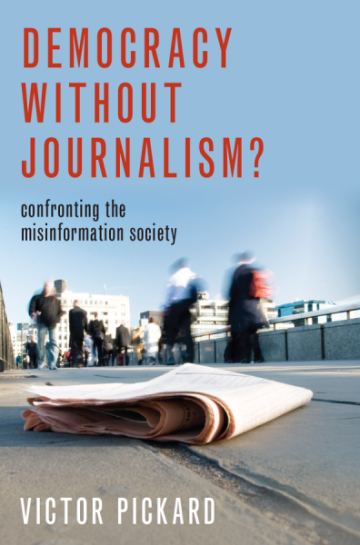Democracy Without Journalism? Q&A with Victor Pickard
Pickard argues that the journalism crisis and the spread of misinformation are rooted in our profit-driven media system.
As local media institutions collapse and news deserts sprout up across the country, the U.S. is facing a profound journalism crisis. Meanwhile, continuous revelations about the role that major media outlets — from Facebook to Fox News — play in the spread of misinformation have exposed deep pathologies in American communication systems.
In his new book, Democracy Without Journalism? Confronting the Misinformation Society, Professor Victor Pickard considers the historical precedents, market failures, and policy inaction that led to the journalism crisis and the spread of misinformation, arguing that the root of both lies in the very structure of our profit-driven media system.
In the following Q&A, Pickard briefly touches on a few of the issues he addresses in Democracy Without Journalism?, which is available from Oxford University Press.
In your book, you argue that the modern journalism crisis can trace its roots to a historical over-reliance on advertising revenue by the media. How did advertising revenue come to be the crux of the American media system, and how does this reliance impact journalism today?
Compared to many news media systems around the world, the US system stands out for its extreme commercialization. As a society, we devote few resources to our public media systems. Instead we’ve allowed our information systems to be governed primarily by market imperatives — namely, profit motives — above all else. For well over a century, newspaper profits have mostly derived from print advertising, but that business model has collapsed with the shift to digital. This structural vulnerability has left our press system weak and underfunded — especially for the kinds of journalism that we think democracy requires — local, international, policy-related, and investigative reporting.

Since the 2016 election, concerns have increasingly been raised over the potential collapse of American democracy. Does the journalism industry — and/or its decline — have an impact on the success or failure of democracy?
Yes, what we all learn in school is correct: A self-governing democratic society requires a free and functional press. What many of us would take as an intuitive argument is increasingly borne out by empirical evidence. Now, almost on a weekly basis, a new study comes out showing that the loss of local journalism has caused serious social harm. These include declines in voting and civic engagement, as well as a less-informed populace, and an increase in politically-driven news, as well as a rise in corruption and mismanagement in local governments. Newspapers have lost over half of their employees since 2000 and these vacancies have not been replaced elsewhere. The resulting “news deserts” spanning vast swathes of the US should be seen as a national crisis.
Despite much lament over the journalism crisis and the rampant misinformation in media, no real policy interventions have been implemented. Why do you think this cause has not been addressed by the government, and what can the public do to get lawmakers invested in this issue?
A number of factors contribute to this policy inaction — I try to tease them out in my book — but probably the biggest two reasons are that first, we often think the market, combined with new technologies, will naturally solve these problems. The second barrier is an unfortunate “First Amendment fundamentalism,” which wrongly assumes that the government has no legitimate role in media systems and markets. To the contrary, government is always involved in media. The real question is how it should be involved. An implicit assumption of our constitutionally guaranteed “freedom of the press” is an actually-existing press system. We should begin with that assumption — that government has an affirmative duty to guarantee that people can create and have access to local news media.
You write in your book that “a public media system is journalism’s last, best hope.” What might a public media system look like in America?
It could and should look very different from what we have today. It needs to be well-funded, encompass all types of media, and, most importantly, be democratic, independent, and bottom-up. Newsrooms should be owned and controlled by the journalists and local communities themselves. They should look like the communities they serve.
You’ve written that this crisis is an opportunity to reimagine journalism in America. Are you hopeful that we can — and will — do that? Why or why not?
Yes, I am hopeful that we can do this — even if the crisis gets much worse in the near term. First of all, our democracy depends on it. But I also take hope in the many experiments that we already see around the country — non-profit news organizations, public investments in local journalism, news cooperatives, new public media initiatives, and so forth. More generally, I take hope in the fact that young people today are not in thrall to the market fundamentalism that has constrained the imagination and political will of previous generations. Increasingly, young Americans today see clearly the effects of market failure, and they are not afraid of social democratic alternatives.



